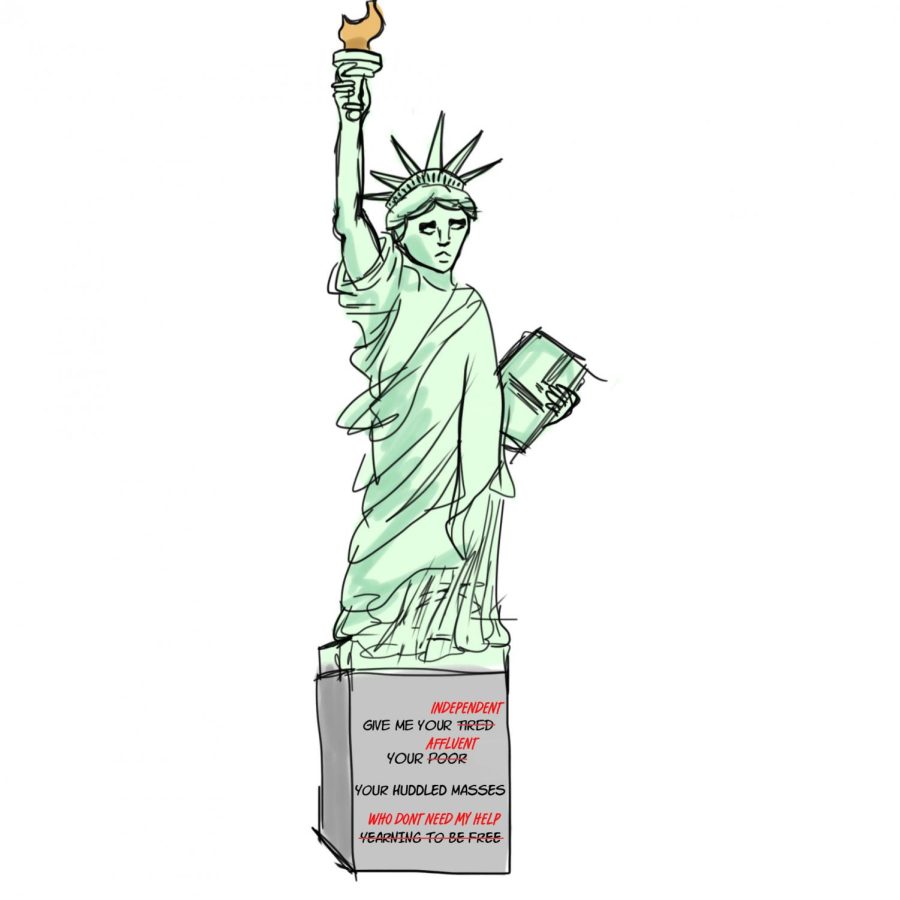Public benefits: Are they really for the public?
The Statue of Liberty’s original inscription of Emma Lazarus’s poem is reworded to say “Give me your independent, your affluent, your huddled masses who don’t need my help,” symbolizing the Supreme Court decision’s message to America’s immigrant population.
February 26, 2020
On Sept. 27, 2019, the U.S. Supreme Court ruled in favor of a stricter criteria on green card applications. In a 5-4 vote, it ruled that the Trump administration is allowed to judge applications for green cards more harshly based on an one’s dependence on public assistance, or their potential for becoming a ‘public charge’. However, this ruling is unfair, as it is discriminatory to judge immigrants on their dependence on public benefits, when public benefits exist only to provide for a nation’s people.
Based on Department of Homeland Security v. New York, the Court’s ruling will allow the U.S. Immigration Office to deny immigrants green cards based on their dependence on public assistance programs. Effectively, the new policy judges immigrants using a “wealth-test.” Although a similar “wealth-test” had already been in place when considering an immigrant’s legal status, only those who needed substantial or sustained monetary aid were taken into further consideration during the green card process. Now, even relying on public benefits in the slightest way appears on an immigrant’s record and can be detrimental to one when filling out an application for a green card.
There are seven main factors that immigrants are now judged on to be considered a public charge. These factors include, but are not limited to, dependence on government cash assistance, supplemental security income, temporary assistance for needy families, general assistance, food stamps, housing assistance, rental assistance and federally-funded Medicaid.
In response, Santa Clara County (SCC) has begun a lawsuit against the U.S. Supreme Court. SCC officials have asserted that this ruling “discourages legal immigrants,” and is unfair to many of the immigrants living in the SCC. Furthermore, they argue that discouraging immigrants from using health benefits like Medicaid will worsen the spread of infectious diseases within communities.
It is discriminatory to judge an individual based on their reliance on public benefits. The U.S. government is unjustified in supposedly providing public health benefits, only to turn back around and judge an individual’s legal status based on their dependence on these free services. Considering immigrants based on their wealth and how dependent they are on public services discourages them from seeking help, often leaving those who need assistance the most without any help.
“A lot of people who aren’t subject to these restrictions are going to become more fearful when accessing public benefits now,” senior Hali Wu said. “If the status of being an immigrant potentially entails a greater risk of being deported, why would they want to put themselves at risk?”
Pew Research Center reported that half of the 2018 U.S. immigrant population came seeking refuge, fleeing from their home countries. When their chance at a green card application is threatened based on use of public benefits, it discourages immigrants from seeking help. As a result, it becomes harder for immigrants to find their individual footing in the U.S.
Additionally, Pew Research Center also reported that the growing immigrant demographic is expected to drive the U.S. workforce as the baby boomer generation retires. The U.S.’s reluctance to help their new workforce can be detrimental to its own economy.
The new ruling by the Supreme Court helps no one — neither the economy nor the people. Although many may claim providing public benefits may damage the economy, it is unrealistic to think that immigrants with few resources would be able to earn a solid living without any initial help. Public benefits exist to help those who cannot entirely provide for themselves until they can. If we help immigrants get on their feet and survive in a new environment, in return, these immigrants will be able to repay the help they received through their own taxes once they find a stable job.
America has always been recognized as a nation built by immigrants. Our founding fathers came from Britain to seek a better chance at life, liberty and happiness, and as a nation, we should play an active role in helping to provide these founding principles to new immigrants. America has no official language, and no specific ethnicity that Americans identify themselves with. Discriminating against certain immigrants because of their financial backgrounds goes against America’s founding principles.
Immigrants are not a burden and should not be treated differently based on their dependence on public benefits. The nation should be playing an active role in helping immigrants find their footing in a new country instead of unfairly judging their legal status by their dependence on the government.



































































